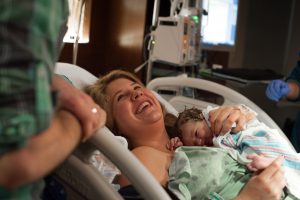 Women are notorious for over-packing. And, let’s face it, you don’t want to leave something home only to realize that it was the one thing that you absolutely needed! So what do you pack for the most important trip of your life – the trip to the hospital to meet your baby?
Women are notorious for over-packing. And, let’s face it, you don’t want to leave something home only to realize that it was the one thing that you absolutely needed! So what do you pack for the most important trip of your life – the trip to the hospital to meet your baby?
I recommend packing your hospital bag around 32 weeks. Your “due date” can vary by 2 weeks each way (so it’s really a one month window). You will want to be prepared. You also don’t want to over-pack because it makes it harder to find what you’re looking for. Let’s break it down into things you will need for yourself, your baby and your partner. At the end of this post you will find a downloadable checklist to use when preparing for your big day.
Hospital Bag Necessities for the New Mom
- Cell phone charger – Pick up a spare charger for around $10. It’s worth having one just for the hospital bag so you don’t have to remember to grab it when you’re in labor. Also, if you forget it at the hospital, it was just a spare.
- Camera and batteries/charger – Even though you can take pictures with your smartphone, you will want a few better-quality photos, especially of your baby with grandparents, aunts/uncles, and big sibling. Some local photographers will even come to the hospital and take photos within the first two days of your baby’s life!
- Snacks – While most of the hospitals have “room service,” we all have our favorite snacks. Foods that are high in protein will provide you with longer-lasting energy, especially helpful during labor.
- PRO TIP: Pick up a bag of Kisses or assorted “fun size” candy bars for the nurses. It’s a small gesture, but it’s always nice to show them how much you appreciate their hard work and dedication to your birth.
- Toothbrush, toothpaste, hair brush – Hospitals have them, but they’re disposable (read: not the best quality). A travel size tube of toothpaste is more than enough for your hospital stay.
- Gown or Robe – Having your own clothes on can make you feel like yourself. I would recommend getting a dark color because you will be bleeding a bit in the first few days (and weeks) and dark colors conceal leaks better.
- Shower Shoes – If you’re going this route, bring something with traction. Or, save space in your bag and use the grippy socks the hospital provides.
- Going home outfit – Something loose-fitting and comfortable is preferable as you will not be able to wear your pre-baby clothing just yet.
- Your Placenta Transport Kit – this will allow you to keep track of your placenta and keep it cool until it can be brought home to be encapsulated.
Hospital Bag Necessities for Baby
- Going home outfit – It is recommended that all clothing (especially baby’s clothing) is washed before wearing to remove any residues from manufacturing. Dreft is commonly recommended, but it is absolutely HORRIBLE as far as chemicals (check out ewg.org for ratings on safety of detergents and other household items).
- The hospital policies in Westchester are split with “allowing” you to dress your baby in his own clothing while in the hospital. Some don’t mind and others prefer your baby is in the hospital-issued clothing. Using their onesies cuts down on the laundry you’ll have to do at home.
- PRO TIP: If you want your baby’s unique personality to shine through in photos with you and visitors, consider a swaddle blanket and hat from home.
- Car Seat – 73% of car seats are not used or installed correctly. I highly recommend having a Child Passenger Safety Technician (CPST) check the installation of your car seat. Mistakes are common and can be deadly. You will also want to familiarize yourself with the proper use of your car seat as hospital staff cannot advise you on this matter.
- Many local police departments have an officer who is a CPST, or you can find a tech here.
- Baby Wash & Shampoo – There are benefits to not bathing your baby in the hospital (read about them here). Look into the benefits if you haven’t already. If you do decide to bathe your baby in the hospital you may want to bring your own baby wash. Use the EWG website mentioned earlier (or the ThinkDirty app) to check the safety of your baby wash.
- Formula – Baby-friendly hospitals promote optimal newborn feeding; they do not have formula or bottles on hand. If you’re delivering at a hospital that isn’t baby friendly and don’t want your baby to have the formula they provide (they will either have Enfamil or Similac), you can certainly bring your own.
For Your Partner
Speaking from experience – have your partner pack their own bag. Then, in theory, they will know where everything is. The last thing you’re going to want to hear while you’re having a contraction and getting ready to get into the tub is “Babe, where’s my bathing suit?”
- Change of clothes – Sweatshirts are great to have. Your hormones will be all over the place and you may want the room colder than your partner prefers.
- Bathing suit – If you’re planning on laboring in the tub, your partner can suit up and support you.
- Cell Phone Charger
- Toothbrush and toothpaste
- Snacks
- List of people to call/text after the baby is born
Things You Can Leave Home
- Diapers and Wipes – Unless you are planning on cloth diapering, or would like to use a specific brand.
- Socks – The hospital provides slipper socks for you to wear. One less thing to pack, and one less thing to wash when you get home.
- Pillows – It’s nice to have your favorite pillow, but it’s one more thing to carry.
- Spare outfits for your baby – Some hospitals prefer your baby wears the garments they issue, so you don’t need to worry about losing your clothes for the baby.
- Pacifier – hospitals have them. If you are breastfeeding you won’t want to introduce one just yet anyway.
Download a printable copy of these checklists here.
Additional Reading
Baby Basics: The Bare Minimum You Need When Bringing Home Baby
Delaying Your Baby’s First Bath


Comments 6
Pingback: C Section Recovery Tips from Your Doulas | Blissful Birthing
Pingback: Choosing a Birth Doula in Greenwich | Birth Support | Blissful Birthing
Pingback: Tips for Choosing a Birth Doula in Putnam County NY | Blissful Birthing
Pingback: What Will I Need After Giving Birth? | Postpartum Care Kit | Blissful Birthing
Pingback: What Color is Amniotic Fluid? | Blissful Birthing
Pingback: processbuild48083.wixsite.comsdehnkys